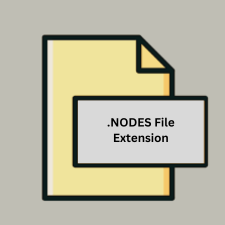.NODES File Extension

AudioNodes Project
| Developer | AudioNodes |
| Popularity | |
| Category | Audio Files |
| Format | .NODES |
| Cross Platform | Update Soon |
What is an NODES file?
The .NODES file extension is associated with AudioNodes, a software application used for creating and managing audio projects. This file type is specific to AudioNodes projects and contains project data, including audio configurations, node settings, and other project-specific parameters.
More Information.
The .NODES file extension was introduced as part of AudioNodes to allow users to save and manage their audio projects in a structured format. The primary purpose of this file type is to store information about audio nodes, their connections, and various project settings. Over time, the file format has evolved to support more complex audio setups and provide greater flexibility in audio project management.
Origin Of This File.
The .NODES file is used by AudioNodes, which is an application developed for digital audio manipulation and project creation. It is designed to help users manage and work with complex audio workflows, making it easier to organize and edit audio projects.
File Structure Technical Specification.
- File Structure: The
.NODESfile typically contains XML or JSON-based data describing the project’s audio nodes, their properties, connections, and other relevant information. It may also include references to audio files and other assets used in the project. - Technical Specification: The exact structure and specifications can vary depending on the version of AudioNodes. Generally, the file format is designed to be both human-readable and machine-readable, allowing for easy editing and integration with other tools.
How to Convert the File?
Windows
- Open AudioNodes: Launch the AudioNodes application.
- Load the .NODES File: Open the
.NODESfile within the application. - Export or Save As: Use the “Export” or “Save As” option in AudioNodes to convert the project to a different format, such as XML, JSON, or another supported file type.
Linux
- Install Wine (if needed): If AudioNodes is only available for Windows, you may need to install Wine to run the Windows application on Linux.
- Open AudioNodes via Wine: Launch AudioNodes using Wine.
- Load and Export: Open the
.NODESfile and use the “Export” or “Save As” option to convert the file to a different format.Alternative:- If you have access to other audio editing tools that support similar file types, you can try opening and converting the file through those tools if they support
.NODESor similar formats.
- If you have access to other audio editing tools that support similar file types, you can try opening and converting the file through those tools if they support
macOS
- Install AudioNodes: Check if AudioNodes is available for macOS and install it.
- Open the .NODES File: Load the
.NODESfile in AudioNodes. - Export the File: Use the application’s export functionality to save the project in a different format.Alternative:
- If AudioNodes is not available for macOS, consider using a virtual machine or compatibility layer to run the Windows version of AudioNodes.
Android
- Remote Access: As there is no AudioNodes application for Android, use a remote desktop application to access a Windows or macOS system where you can convert the file.
- Open and Convert: Open the
.NODESfile in AudioNodes on the remote system and export it to a different format.Alternative:- Check for any Android-compatible audio editing apps that might support importing
.NODESfilesor have similar functionality.
- Check for any Android-compatible audio editing apps that might support importing
iOS
- Remote Access: Similar to Android, use a remote desktop application to access a system running AudioNodes or a compatible application.
- Open and Export: Open the
.NODESfile in AudioNodes and convert it to another format.Alternative:- Investigate if there are any iOS apps that can handle or convert similar audio project files if direct support for
.NODESis not available.
- Investigate if there are any iOS apps that can handle or convert similar audio project files if direct support for
Other Platforms
- Use Compatible Software: For other platforms, look for any software that supports
.NODESfiles. Open the file in such a program and use its export features. - Remote Desktop: If direct software is unavailable, use a remote desktop solution to access a machine with AudioNodes or similar software for conversion.
Advantages And Disadvantages.
Advantages:
- Organization: Provides a structured way to manage complex audio projects with multiple nodes and connections.
- Flexibility: Allows for detailed configuration of audio elements and workflows.
- Integration: Can be used in conjunction with other tools and software that support the same file format.
Disadvantages:
- Compatibility: Limited to AudioNodes or compatible software; may not be widely supported by other applications.
- Complexity: May require a learning curve to understand and effectively use the file’s structure and data.
How to Open NODES?
Open In Windows
To open a .NODES file in Windows: Install AudioNodes or any compatible application that supports .NODES files. Open the file directly within the application to access and edit the project.
Open In Linux
To open a .NODES file in Linux: Use a compatibility layer like Wine to run AudioNodes if it is available for Windows. Alternatively, look for any Linux-compatible audio project management tools that support .NODES files.
Open In MAC
To open a .NODES file in macOS: Install AudioNodes if it is available for macOS. You can also check for any macOS-compatible software that supports .NODES files.
Open In Android
To open a .NODES file on Android: As of now, AudioNodes does not have an Android version. You might need to use remote access to a desktop system or find alternative software that can handle similar file formats.
Open In IOS
To open a .NODES file on iOS: There is no known iOS application that directly supports .NODES files. You may need to use a desktop application or remote access to handle the file.
Open in Others
Other Platforms: For other platforms or devices, the file would generally need to be opened with AudioNodes or compatible software. If the application is not available for your platform, consider using file conversion tools or services that might support the .NODES format.













